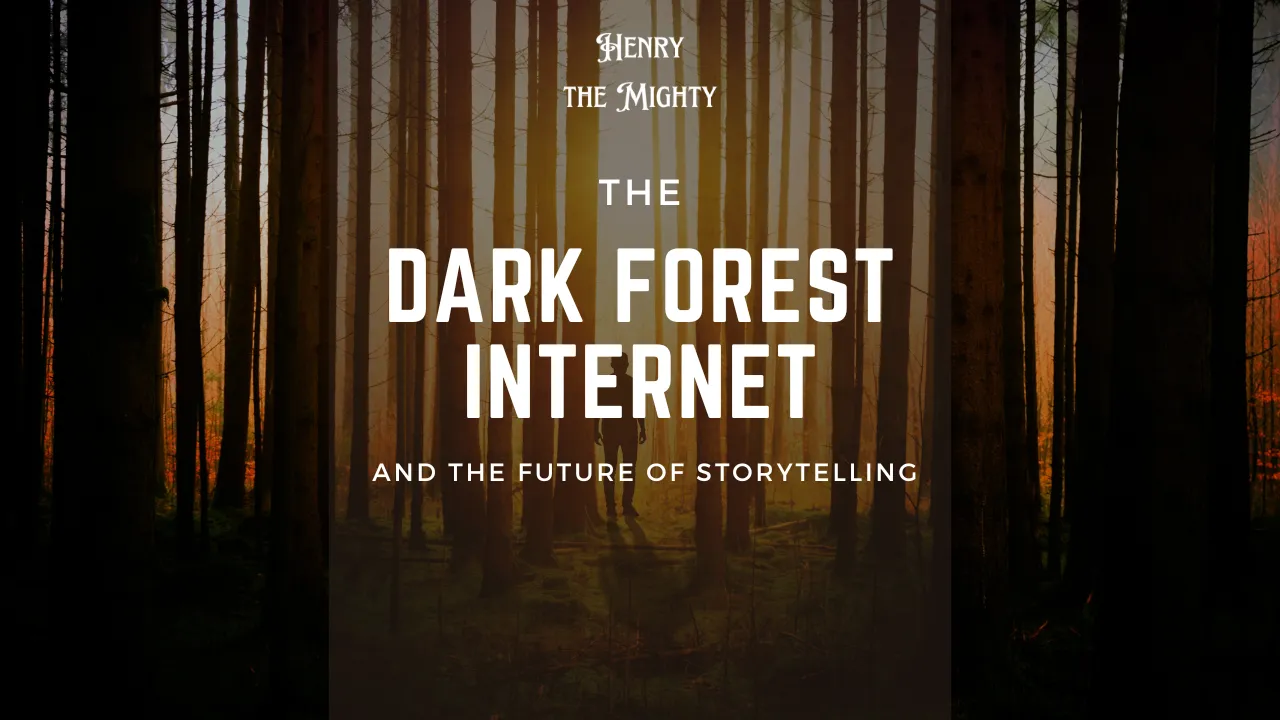
Italian version below ...
What's the future of Storytelling, now that AI is so popular and accessible?
As someone who doesn't like AI, I'm sure of one thing...
The future of Storytelling (if done right) is very bright.
1: The "Dark Forest Internet" Theory
What we call AI is, for the most part, Generative Artificial Intelligence. A complex algorithm that must generate something (text, images, etc...).
It does that by training on content that already exists (photos, articles, books and so on).
2: The forest is growing
Since AI is almost free and since most people are lazy, more and more "writers" and "artists" are polluting the web with AI generated content.
And this is summed with the already massive amount of low quality content that we all know and love.
3: AI learning from AI
AI, to be relevant, must train itself constantly on new content. But what if more and more articles, images and videos are AI generated?
AI is already starting to train on its own material, averaging itself out.
4: The content average
AI cannot distinguish between a masterpiece like "War and Peace" and a collection of BuzzFeed listicle. To it everything is training material.
AI, unless prompted differently, will try to generate an average, readable and socially acceptable result.
5: The more average the results, the more average the training
We are about to talk about storytelling, don't worry. What happens when AI sees average content more and more often?
It will create more and more average results, even if you use a quality prompt.
6: The same will happen to stories
Obviously, AI can generate stories. And, since it trained on entire libraries of content, it can create a great variety of stories.
But what happens when more and more stories are similar to each other and very "socially acceptable" and bland?
7: Stories become predictable
This is not something new. Look at most movies and novels published in the last 20 years: they all follow a structure and, when you start studying storytelling, it is evident.
Now imagine this multiplied...
8: AI can open new creative outlets
An example is Rock, Paper, Scissors, that is made with the support of AI (and it's one of the most genius parodies I've ever seen).
But most people will use AI in the laziest way possible.
9: The human touch is always mandatory
Stories are so powerful because they communicate straight to the depths of our souls. Creativity, empathy, emotions, fun...
All these elements are what make stories effective.
10: This is why the future of Storytellers is so bright
The more predictable most stories are, the more people will be attracted by genuine, human stories.
Plus, always remember that storytelling isn't just for your audience: creating stories is an amazing tool for your own mental health and improvement.
🇮🇹 🇮🇹 🇮🇹 🇮🇹 🇮🇹 🇮🇹
Versione Italiana
🇮🇹 🇮🇹 🇮🇹 🇮🇹 🇮🇹 🇮🇹
Qual è il futuro dello Storytelling, ora che l'IA è così popolare e accessibile?
Da persona che non ama l'IA, sono sicuro di una cosa...
Il futuro dello Storytelling (se fatto bene) è molto luminoso.
1: La teoria della “Foresta Oscura di Internet
Quella che chiamiamo IA è, per la maggior parte, Intelligenza Artificiale Generativa. Un algoritmo complesso che deve generare qualcosa (testo, immagini, ecc.).
Lo fa allenandosi su contenuti già esistenti (foto, articoli, libri e così via).
2: La foresta sta crescendo
Poiché l'intelligenza artificiale è quasi gratuita e la maggior parte delle persone è pigra, sempre più “scrittori” e “artisti” inquinano il web con contenuti generati dall'intelligenza artificiale.
E questo si somma alla già enorme quantità di contenuti di bassa qualità che tutti conosciamo e amiamo.
3: L'IA che impara dall'IA
L'IA, per essere rilevante, deve allenarsi costantemente su nuovi contenuti. Ma cosa succede se sempre più articoli, immagini e video sono generati dall'AI?
L'IA sta già iniziando ad allenarsi sul proprio materiale, facendo una media.
4: La media dei contenuti
L'intelligenza artificiale non è in grado di distinguere tra un capolavoro come “Guerra e Pace” e una raccolta di listicle di BuzzFeed. Per l'intelligenza artificiale tutto è materiale di addestramento.
L'IA, a meno che non venga sollecitata diversamente, cercherà di generare un risultato medio, leggibile e socialmente accettabile.
5: Più mediocri sono i risultati, più mediocre è la formazione
Stiamo per parlare di storytelling, non preoccuparti. Cosa succede quando l'intelligenza artificiale vede sempre più spesso contenuti medi?
Creerà risultati sempre più mediocri, anche se si utilizzano suggerimenti di qualità.
6: Lo stesso accadrà alle storie
Ovviamente, l'IA è in grado di generare storie. E poiché si è addestrata su intere librerie di contenuti, può creare una grande varietà di storie.
Ma cosa succederà quando sempre più storie saranno simili tra loro e molto “socialmente accettabili” e insipide?
7: Le storie diventano prevedibili
Non è una novità. Guarda la maggior parte dei film e dei romanzi pubblicati negli ultimi 20 anni: tutti seguono una struttura e, quando inizi a studiare lo storytelling, è evidente.
Ora immagina questo moltiplicato...
8: L'intelligenza artificiale può aprire nuovi sbocchi creativi
Un esempio è Rock, Paper, Scissors, realizzato con il supporto dell'IA (ed è una delle parodie più geniali che abbia mai visto).
Ma la maggior parte delle persone utilizzerà l'IA nel modo più pigro possibile.
9: Il tocco umano è sempre obbligatorio
Le storie sono così potenti perché comunicano direttamente con il profondo della nostra anima. Creatività, empatia, emozioni, divertimento...
Tutti questi elementi rendono le storie efficaci.
10: Ecco perché il futuro degli Storyteller è così luminoso
Più la maggior parte delle storie è prevedibile, più le persone saranno attratte da storie autentiche e umane.
Inoltre, ricorda sempre che lo storytelling non è solo per il tuo pubblico: creare storie è uno strumento straordinario per la tua salute mentale e il tuo miglioramento.